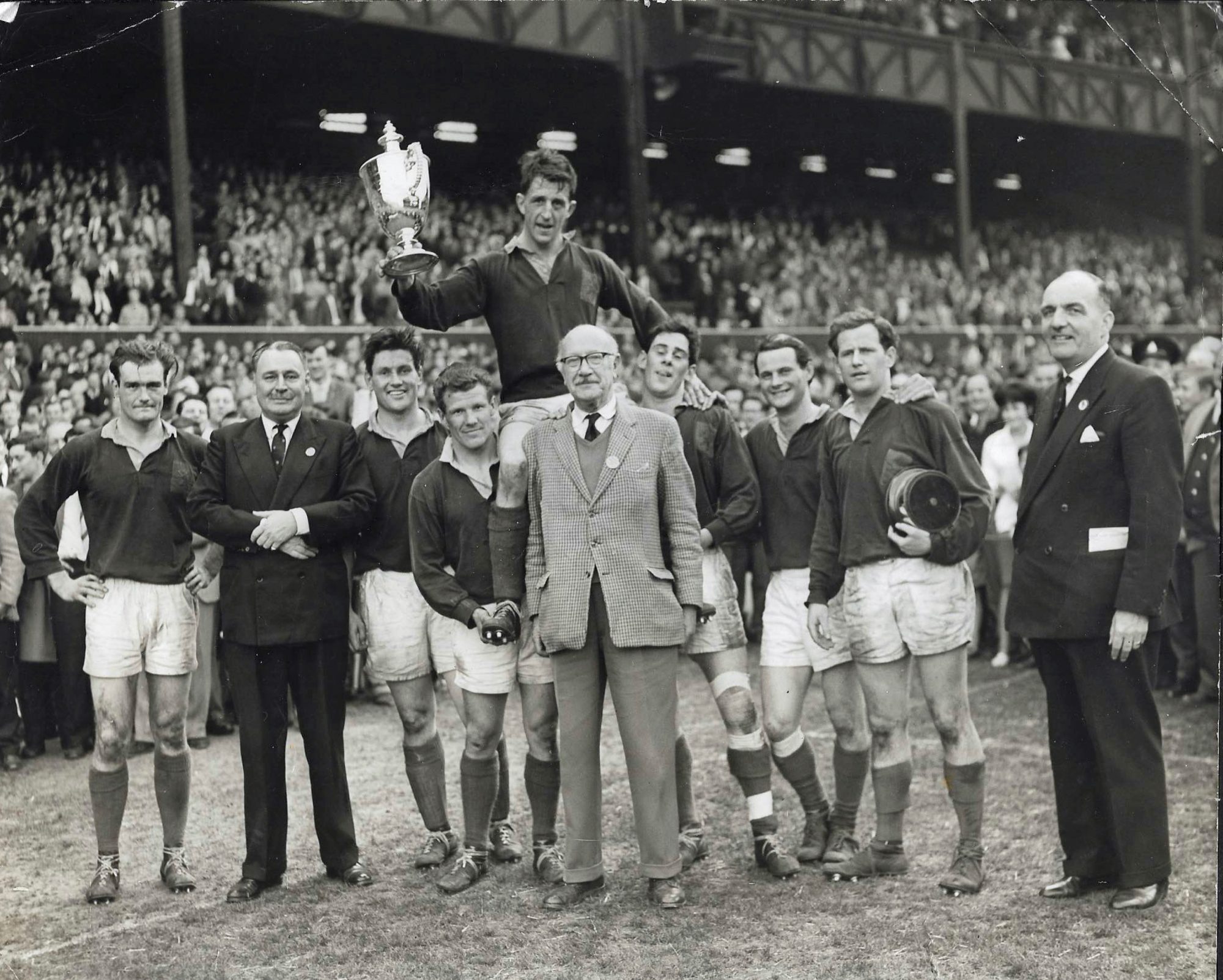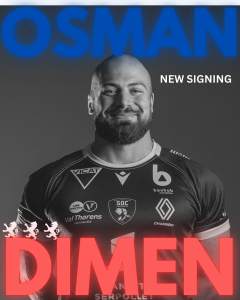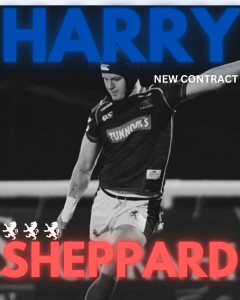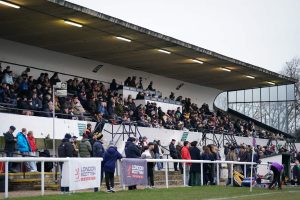
Robin Marshall, who in October became the fifth former London Scottish captain to pass away in 2020, may have just missed out on international honours in an era when so many of his close friends were capped, but was an inspirational leader on the pitch at XV-a-side and Seven-a-side rugby, and off the field as club president. He was rightly inducted into the Club Hall of Fame in 2019 when already suffering from the cancer that would finally take him from us.
Traditionally the club captain was appointed for a single season – in the pre-professional days the captain had a lot more to do than direct penalties to the corner and negotiate that day’s breakdown rules with the referee. A key recruiter for a start, during the week he worked with the selectors and committee to pull a side together, lead training sessions, and might end up himself phoning around to check availability and impart the good and bad news about selection. It was rare then for a player to be skipper twice, and Robin Marshall stepped up for two seasons in a row, 1961-62 and 1962-63. At the same time, he took over the reins of the wonderful Sevens side of the period, leading them to the 1962 Middlesex triumph, having already weeks earlier hoisted the Melrose trophy for the first time, and repeated the feat at Twickenham 12 months later.
Robert Ian Marshall, known to all as Robin, was born in Edinburgh, and grew up in Colinton. His father was also Robert Ian, but went by his middle name. Ian would captain Edinburgh Accies in the 1921-22 season, and later spent time in London, and appears in the 1925-26 London Scottish team photograph. Robin had two brothers, David and John and a half-sister Anne. School was, initially, the Edinburgh Academy and then Merchiston Castle, where he won the top literary prize and music prizes. The old boys team he captained included future fellow London Scots Cameron Boyle and Ronnie Lamb as well as his brothers.
From school, Robin spent his period of National Service in Egypt, guarding the Suez Canal. Patrolling on his Triumph motorbike, as he would tell his son Andrew, “you didn’t hang about when you were riding between patrol posts.”
Duty done, he returned to Edinburgh. His brother John had gone up to Oxford and Robin was also offered a place but Ian, tough and strict, decided Robin wasn’t responsible enough and would be better suited to accountancy (!). Thus Robin ended up staying in Edinburgh and qualified as a chartered accountant with Thomas McLintock, now part of KPMG. He moved on to Dewar’s distillery where he became finance director and then to Slater Walker which was then the equivalent of what we would term a private equity group.
He then set up on his own as a company doctor going on to buy an upmarket meat/ pie maker Stephens, who supplied Harrods amongst others, later merging them with a firm called Farmer Giles. Another business he worked with was Wace Group, printers owned by his team-mate Frans ten Bos and where another club captain, Gordon MacDonald, also worked.
All this was to come.
From 1950 to 1958, ether side of the Egypt interlude, Robin Marshall followed his father into a fine Edinburgh Accies side that included his brothers. Andrew Marshall recalls:
“David, the eldest, was a hard second rower and John was the hooker, with Dad on the flank. but for a time his father wouldn’t let him play rugby mid-week while he was meant to be studying for his CA. He would sneak off and play for an invitation side on the Wednesday afternoons under the name of Jock Strap but was eventually rumbled when a reporter printed in the papers, that a certain J Strap bore an uncanny resemblance to one RI Marshall of Edinburgh Academicals fame.”
Needless to say Robin qualified anyway, and would go on also to be captain in 1956-57, as was John the following season. Under Robin’s leadership, the Accies were Scottish champions. Writing for Frank Morris’s history of London Scottish* Robin recalled:
“I well remember a succession of Christmas visits by the [London] Scottish to Raeburn Place … The visitors’ sides were always full of interest, talent abounded and although Kim Elgie* comes particularly to mind, so too do two of Accies’ most distinguished members, Donald Sloan and Hamish Inglis who were frequently on the London Scottish side.” And in a comment which holds as true today: “I know from the other side just how much good it does for the Scottish to appear and play good rugby before Scottish crowds as often as possible.”
Andrew also recalls “There is a nice story of a particularly abrasive match where dad took a nasty shoeing at the bottom of a ruck. When the next ruck occurred, and the whistle blew, the poor chap didn’t get up from the bottom of it. The Marshall brothers had a reputation for looking after each other.”
Thus it was inevitable that when McLintocks moved Robin to London, he would like so many before and since, swap the Accies’ hooped shirt for the navy blue of London Scottish. Robin took up the story for the centenary history:
“I drove south in my little two-seater together with Hamish Inglis who was returning to London. Sadly, the car, to which I was particularly attached, ended its days a couple of months later deeply embedded in a pedestrian refuge in the middle of the Cromwell Road about halfway to my digs from the Corkscrew Club. Gordon Mackenzie Wylie* was on the ‘phone within days of my arrival in London with news of Sunday lunchtime at the Victoria, and cricket at Chalfont St Giles. Mac Wylie knew the whole club and was a wonderfully welcoming skipper.”
Andrew recalls his father further illuminating that first journey south: “He drove south with Hamish in his beloved gold soft top MG. They left work at 6pm, as Hamish recounts, they found a hay barn on route, where they managed to get a few hours’ sleep and arrived in time for work at the next morning.”
What would follow would be a stellar rugby career and contribution to our club for many more years after that. Modestly Robin would write: “it was my good fortune to play for the Scottish with a great number of quite unusually gifted players.” His teammates would include him in that list: Robin Marshall was an outstanding back rower in an era when both club and country were well stocked in such positions.
That first season, Mac Wylie as captain introduced organised training evenings for the first time – previously, players had generally trained at their nearest ground save for a hardy dozen who would meet for a few laps of the pitch before retiring to the pub for a game of darts. Robin immediately made himself a fixture in the 1st XV, getting his club cap alongside the likes of Eric Cruikshank, Ken Scotland, Iain Laughland, Jim Shackleton, Frans ten Bos, Doug Smith and Ronnie Thomson. It was not bad season for the club, but included defeats to Accies at home at the very start of the season and back in Edinburgh for the annual Christmas fixture, which must have left Robin feeling somewhat torn, his brothers presumably being on the opposing side. Indeed, for a time the club’s results really did not reflect the talent available – in successive seasons Scotland selected six, seven and then five of Robin’s team-mates. But improvements came under his leadership: additions to the regular side included Boyle, Norman Bruce and MacDonald … The Edinburgh Evening News noticed: their rugby commentator, who in the fashion of the time went by the pseudonym Raeburn felt the Scottish sectors should just pick the club’s entire XV for the trial match:
“Under the inspiring leadership of Robin Marshall, elected captain for the second year … a tribute to his prowess… Scottish are having the most successful season in years. Marshall has gathered around him a spirited adventurous band of men who play zestful rugby in the true manner of the game.”
Not surprisingly Robin was asked to hang on to the metaphorical arm-band for a further stint, and with even more resounding success, the 1st XV having their best season since 1955.
In the meantime, Robin Marshall had also become a stalwart of perhaps the finest Sevens side the short form of the game had seen since its invention at Melrose in 1883. In a six season spell London Scottish would win England’s premier tournament, the Middlesex, five times (and be runner-up in the sixth), twice do the Middlesex-Melrose double, and finish runners-up on a third visit to the Greenyards. Robin was the only forward to play all the first four Middlesex victories and the first at Melrose.
For the two 1962 finals he was also captain, the only one of the VII not a full international cap. Morris records the year as the club’s zenith in the short game. The style was well-honed and much written about but still, opponents could not cope: slow build up, valuing possession above all, and the clever use of decoys to draw defenders, enabling lightning fast backs to tear away and score. Morris adds: “It must be remembered that they won without a recognised hooker. Robin Marshall who took over these duties was quite cheerful about his short-comings in that respect, knowing that it did not matter if the opposition won the ball for they would not keep it long.”
Norman Mair writing in The Scotsman gave the forwards their due:
“Watherston has enviable pace and he gave the Seven the height and reach necessary at the lineout, Marshall not only hooked adroitly but like … Boyle was at once mobile and industrious, and he and Boyle all afternoon were noticeably certain in their tackling. London Scottish were obviously imbued with the concentration and will to win which has never been absent from the play of their captain Robin Marshall.”
Hawick, sevens specialists dispatched in the final at Melrose in 1962, would be invited to Middlesex in 1963 and fall again to Robin’s side in the final.
At his induction to the club Hall of Fame in 2019 Robin admitted that the post-tournament excesses included driving the wrong way around the Richmond Circus roundabout, twice, with the winning VII all piled into his 2-seater MG.
It is surely no coincidence that that 1964, with Robin no longer in the side, Scottish lost the two sevens finals.
Meanwhile there was more to life for Robin than rugby. Retirement coincided with the arrival of his second child, or perhaps that was no coincidence… Still he was an active member of the Caledonian club for a number of years, and once he retired from rugby, golf kept him out of the house.
Robin was a member of Muirfield Golf Club for 40 years and his beloved Luffness in East Lothian for almost 60 years. but he needed somewhere to play nearer his English home so he and his team mates including ten Bos, Shackleton, Inglis, MacDonald and Lamb looked for a club west of London that they could get to by train. Denham Golf Club uniquely has a dedicated station, one stop out from Marylebone, and so got the vote. Thus began a London Scottish connection that persists today. Robin would be a member for 59 years and captain in 1976.
But his connection with London Scottish never wavered. He was a staunch committee man for many years, Fixtures Secretary from 1966-70 and of course the club’s 11th President from 1987-90.
He was a less comfortable spectator. Andrew recalls captaining the club U21s in the 1980s. Returning home from each match he would be asked by Robin how it had gone, and Andrew would recount the highs and lows; after half a dozen matches Robin proffered some extensive technical advice – “a friend” had been at the games and spoken to him about it … years later Jenny Marshall would let slip that the proud father had in fact been at every one of the matches himself!
Robin Marshall met Jenny Cox in 1959 and they married at St Columba’s Church of Scotland in 1961. The newly-weds moved out to Denham and had Nicola (1962-2016) and Andrew. Jenny sadly predeceased him in August. Robin is survived by Andrew and his wife Emma, and grandchildren Hannah, Lydia and Rory.
Last words go to the man himself; writing for the club’s history in 1978:
“What a wonderful jumble of happy memories can be conjured up – Cornish tours, Border tours, Christmas tours, various sevens tournaments (and I remember a marvellous floodlit Tournai-au-Sept in Paris which started at 22:00 hours and finished at 01:00 hours, at least as far as play was concerned…. But above all the three characteristics of the club which I hope will continue to be apparent to all for at least another 100 years are enterprising combined play, exceptional individual talent or style and a willingness to give a lot of pleasure by having an awful lot of fun.”
Robert Ian (“Robin”) Marshall, 29 December 1932 – 26 October 2020
Captain 1961-63
President 1987-1990
Paul McFarland
And London Scottish Chairman Malcolm Offord remembers:
“Robin was President when LSFC toured to Argentina in 1989, the first British side to travel to Argentina after the Falklands War. I was privileged to be part of that tour. Robin told us that the Foreign & Commonwealth Office had phoned him to ask us to desist from wearing our kilts in Argentina in case that caused offence owing to memories of the Scots Guards in action. We had a team meeting… and decided to wear our kilts! in fact, his son Andrew did not take his off in three weeks…”



